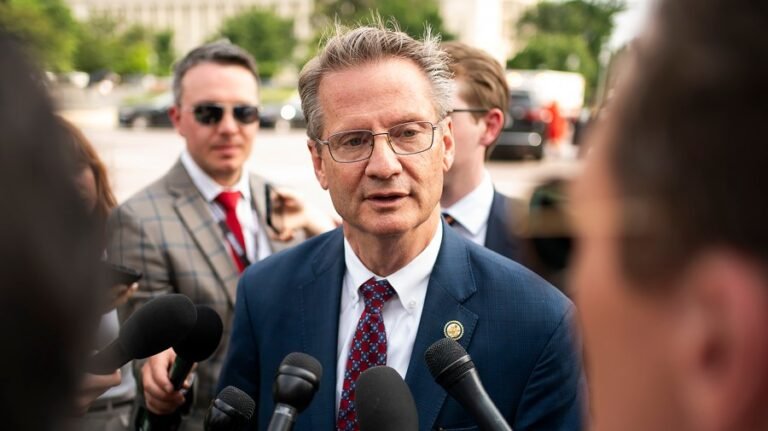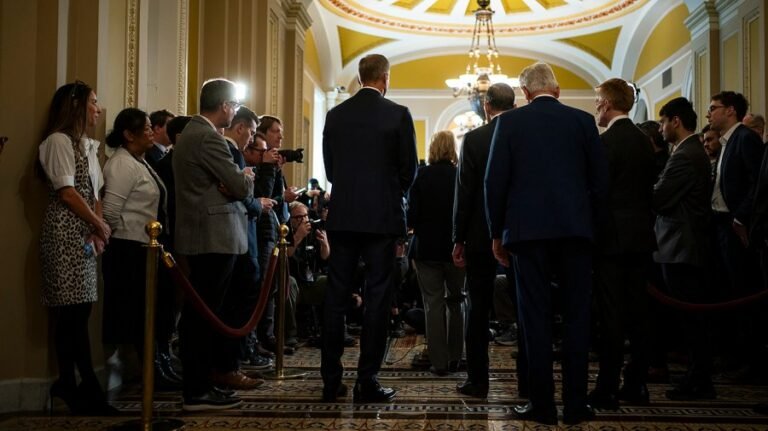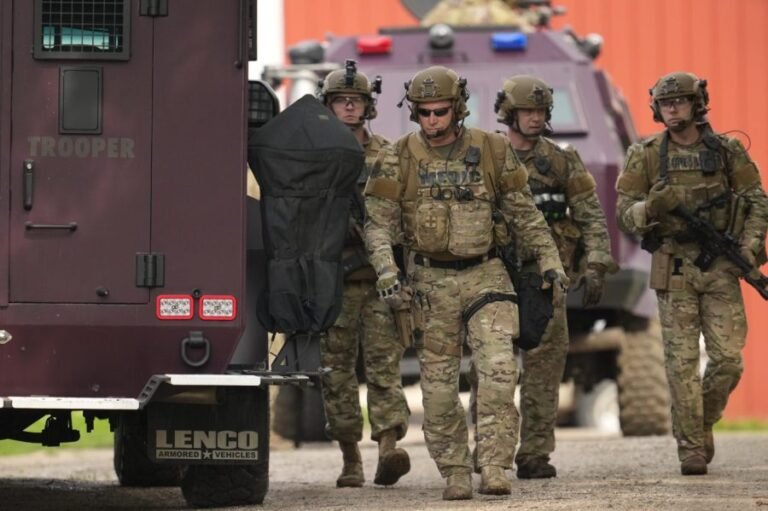
Tremors spread though the political world on Monday after the weekend’s fatal shooting of a Democratic lawmaker and her spouse in Minnesota, and another shooting, allegedly by the same perpetrator, that injured a second lawmaker and his wife.
The suspect, Vance Boelter, 57, was apprehended late Sunday. He faces murder charges in state courts. On Monday, federal prosecutors also charged him with murder.
Boelter is accused of killing Minnesota state Rep. Melissa Hortman (D) and her husband, Mark, at their home in a Minneapolis suburb in the early hours of Saturday. Prosecutors allege that, shortly before, he had shot state Sen. John Hoffman (D) and his wife, Yvette, at their home. The Hoffmans have undergone surgery and are expected to survive.
Here’s what we know so far.
New details emerge — including other homes targeted
A major development Monday came with the unveiling of the federal charges against Boelter — and the details from prosecutors that accompanied those charges.
Boelter has been charged with murder and with stalking.
Federal prosecutors allege that the suspect had visited a total of four lawmakers’ homes. In addition to the two where shootings took place, he is said to have visited an address where his target was not home, and to have left another address without opening fire, perhaps because of a police presence there.
Prosecutors did not identify the lawmaker, but state Sen. Ann Rest (D) identified herself, saying that she had been told that Boelter had been close to her home during the hours in question. She thanked local police officers for having “saved my life.”
Authorities said other documentation appeared to show that Boelter had been planning the attacks for months.
Some lawmakers confirm they were on the list
Boelter apparently had a list of targets, as well as copious other plans.
Both of Minnesota’s senators, Sens. Amy Klobuchar (D) and Tina Smith (D), have confirmed that they were on the list. An unnamed law enforcement officer told the New York Times that Reps. Ilhan Omar (D-Minn.), Kelly Morrison (D-Minn.) and Angie Craig (D-Minn.) were also among the targets.
Boelter’s lists also extended beyond Minnesota. Abigail Leavins, a reporter for a website that covers politics in Wisconsin, said that Sen. Tammy Baldwin (D-Wis.) and Rep. Mark Pocan (D-Wis.) were also confirmed to be among the potential targets. Lawrence Andrea of the Milwaukee Journal Sentinel reported that Rep. Gwen Moore (D-Wis.) was on the list, too.
Multiple media outlets have reported that all the politicians allegedly targeted are Democrats. The list also appears to have included some addresses associated with reproductive rights, including abortion providers and Planned Parenthood clinics.
Federal authorities have declined to identify a clear and specific political motive so far.
But media interviews of Boelter’s friends and acquaintances have formed a picture of a socially conservative, vigorously anti-abortion figure who, at least one friend said, supported President Trump in last year’s election.
In one clip available online, he delivers a sermon to an audience in Africa complaining that many American churches “are so messed up they don’t know abortion is wrong.”
His roommate told reporters that Boelter was “a Trump supporter” who “would be offended if people called him a Democrat.”
GOP senator ignites controversy with social media posts
The tragedy of the killings was soon followed by a political firestorm.
The instigator was Sen. Mike Lee (R-Utah), who on Sunday tweeted a photo of the suspect with the caption, “This is what happens when Marxists don’t get their way.”
A short time after, Lee sent another post with two photos of the suspect, including one in which he was wearing a mask, with the caption “Nightmare on Waltz Street.”
This was widely interpreted as a reference to Minnesota Gov. Tim Walz (D), Vice President Harris’s running mate in the 2024 election. Influencers within the online right have been floating a conspiracy theory about Walz and the shooter, based on the fact that Walz had reappointed Boelter to a state economic panel in 2019.
Democrats and liberals reacted furiously.
Klobuchar told MSNBC on Monday that she “condemned” what Lee had done, and said she would “speak to him about this” when they next met.
“What I’m going to tell him is: This isn’t funny,” Klobuchar added.
Smith, at the Capitol, told reporters she was also seeking out Lee for a conversation. The Hill’s Al Weaver posted a photo of the two in conversation soon afterward.
Weaver also reported that Smith told reporters she wanted Lee to hear from her directly “about how painful that was and how brutal that was to see that on what was just a horrible, brutal weekend.”
Caroline Gleich, who was the Democratic nominee in last year’s Senate race in Utah — ultimately losing to Lee’s colleague Sen. John Curtis (R) — told The Hill in a video interview that Lee’s tweets were “absolutely despicable.”
Lee has not deleted the tweets. His office did not respond to an invitation to comment.
Misinformation proliferates
The hours since the shooting have seen significant misinformation.
The Minnesota Star Tribune was among the news outlets trying to push the tide of confusion back.
It noted that many members on the state board on which Boelter once served “were not politically connected [nor] would have meaningful access to the governor.” Board members are purportedly appointed because of their insights into particular industries or areas of knowledge, not because they reflect a governor’s ideology. A source in Walz’s office also told the Star Tribune the governor did not know Boelter.
The news organization also noted that, contrary to online speculation, Boelter’s wife had never served as an intern for Walz. There appears to have been some confusion over another person with the same name, married to someone else.
But at times, careful reporting seems little match for the tsunami of often-erroneous social media speculation.
A new focus on the toxic tone of American politics
Reams have been written about the growing polarization of American politics over the past couple of decades. But there is a lot of evidence that the nation’s political gulf just keeps getting wider and more bitter.
The shootings in Minnesota are sure to produce more questions about where this will all lead.
Trump himself was almost killed last July during a rally in Pennsylvania. A California man in April pleaded guilty to trying to kill conservative Supreme Court Justice Brett Kavanaugh. Several men were convicted in a plot to kidnap Michigan Gov. Gretchen Whitmer (D) in 2020.
With no end in sight to the enmity in the political system, attention is turning to increasing security for lawmakers and others in public life.
House Minority Leader Hakeem Jeffries (D-N.Y.) — along with the top Democrat on the House Administration Committee, Rep. Joe Morelle (D-N.Y.) — wrote to Speaker Mike Johnson (R-La.) on Monday asking to increase the amount of money available to lawmakers to bolster security.


